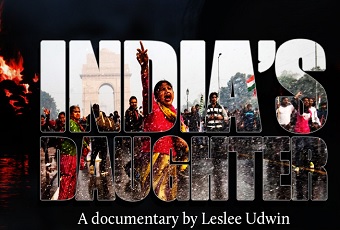BY NEHA NEGANDHI
It is as it always has been in India: men are superior, women don’t belong in society. There was not shock or surprise when I saw the BBC documentary, “India’s Daughter” on YouTube; instead I had a meteoric rising of rage only to descend into a deep depression. Watching the harrowing images and interviews, it only reiterated how India’s unwavering patriarchal society has created conditions ripe for that heinous crime in Delhi and the abusive mentality that still continues to flourish today.
British filmmaker Leslie Udwin painstakingly details the gang-rape and murder of a 23-year-old medical student, Jyoti Singh who was on a private bus home after watching a movie with a male friend. It narrates her faithful and devoted parents who cashed in their “ancestral land” to pay for her schooling while juxtaposing images of public protests ignited after Jyoti’s rape. At the center of the film is the crux ofIndia’s shame: the jailhouse interview with the bus driver who was convicted of the rape and murder and is currently sentenced to die. He says unaffectedly, “A decent girl won’t roam around at nine o’clock at night” and. “A girl is far more responsible for rape than a boy.” The rapist, Mukesh Singh, echoes what India’s masculine mirror has curated for centuries: women are to blame for any blatant abuse and violence against them.
These convicted rapists learn what other men in society inadvertently teach them. Hundreds of millions of Indian men are taught that if a woman dresses immodestly, if she chooses to go out after 9 pm, if she wants to go to bars/clubs then she is asking to be raped. Some of these teachings could be symptoms of little to no education and/or growing up poor and deprived but mostly it is learning the widespread belief that women are subservient and they [are only good for] as Singh says, “housework and housekeeping.” What is inexcusable are the well educated leaders who fully embody this repugnant thinking such as the lawyers of the six convicted rapists and murderers, M.L. Sharma and A.P. Singh. In extensive film interviews, Sharma says, “We have the best culture. In our culture, there is no place for a woman.” Even more shocking is when defense lawyer Singh says, “If my daughter or sister disgraced herself, I would take this sister or daughter to my farmhouse, and in front of my entire family, I would put petrol on her and set her alight.” If these men, who are proficient in the letter of the law that gives women equal rights inIndia, are projecting these regressive thoughts, what are the others to learn?
In sure-fire response to the furious riots after Jyoti Singh’s murder, the government passed laws to protect and serve the security of women. Mostly though, these have been knee-jerk reactions and lip service to gloss over the real truth which is implementing these new laws and security measures. But where does legal change begin when newborn girls are subjected to female infanticide at rates that are still alarmingly high; when discrimination even for nutrition is taught at the dinner table, as discussed in the film, a boy is given more milk than his sister because he needs more energy; and a woman’s choice is only good when the man chooses for her? How does change begin when the enforcers of law and the society in general does not collectively stand up against discrimination and violence against women?
The Indian government has banned the film from public view stating it is perpetuating violence against women and creating a “white-savior” notion amongst international audiences. It has gone on to demand that all copies of the film be permanently removed and Google (who owns YouTube) has complied. (I was able to watch the film before YouTube was forced to remove it.) I happened to be in India visiting when the new government was elected. The tangible feelings of hope and change permeated the air. But sadly, things have quickly resumed to the way they have always been: censorship and ignorance. It is not unusual for a newly-elected leader to showcase his shiny government or to sweep injustices under the proverbial rug. The reality is,India’s government wants to salvage its international image and any undesirable news or story is dubbed “international conspiracy to defame India” and is irrevocably and immediately immobilized. The real question is how to apply this same swift and sure justice to the societal depravity and disease that permeates its society.
I am an Indian Daughter. I am proud to be labeled this but in doing so, I realize the prejudices and contradictions it comes with. In a land where female deities are venerated equally as much as their male counterparts and its largest democracy elected its first female Prime Minister in 1966, women are still treated as second class citizens by a majority of the population. These prejudices and contradictions can only be resolved through education. To ban “India’s Daughter” is like sticking our head in the sand and pretending that gender inequality does not exist. Instead, we should make sure that every man and woman watches it, because in doing so we promote a dialogue that banishes ignorance and encourages a soul-searching look at the underlying cultural gender inequalities. Or should we “just be silent and allow the rape”?





